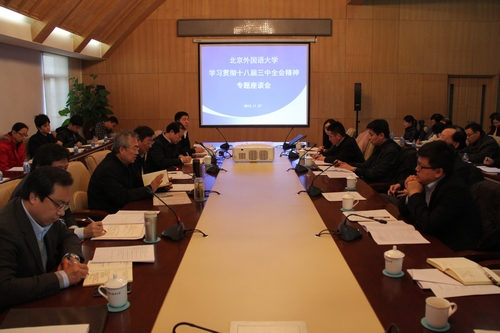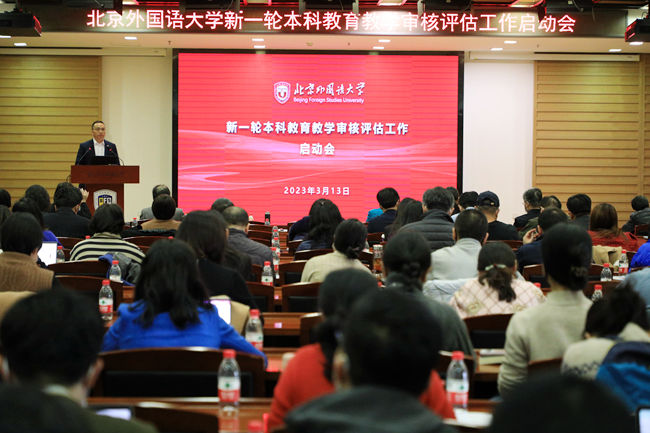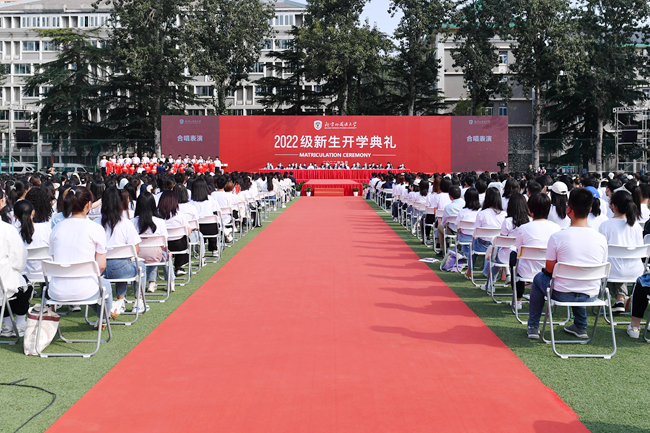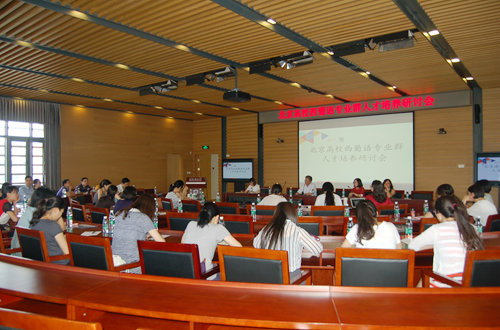Our School Held A Special Seminar On The Spirit Of The Third Plenary Session Of The 18th Central Committee Of The Central Committee
Our School Held A Special Seminar On The Spirit Of The Third Plenary Session Of The 18th Central Committee Of The Central Committee
On November 27, our school held a special symposium on the spirit of the Third Plenary Session of the 18th Central Committee of the Party, further transforming ideas, and promoting the comprehensive r
On November 27, our school held a special symposium on the spirit of the Third Plenary Session of the 18th Central Committee of the Party, further transforming ideas, and promoting the comprehensive reform of the school. Yang Xueyi, Secretary of the Party Committee Yang Xueyi, deeply explained the spirit of the Third Plenary Session of the Eighteenth Central Committee of the Central Committee, and put forward clear requirements for the spirit of learning, propagating, and implementing the spirit of the Third Plenary Session: First, carefully studying documents, accurately grasping the Third Middle School of the 18th Central Committee The spiritual essence of the plenary session; the second is to strengthen organizational leadership and continuously lead to the study and propaganda work of the Third Plenary Session of the Plenary Session; the third is to combine the actual work of the work and transform the spirit of learning and implementation into the strong motivation to do the current work and deepen school reform Essence The principal Han Zhen made a keynote speech. Professor Zhang Zhongzai and seven teachers and students representatives made exchanges, and talked about the understanding of the spirit of the Third Plenary Session of the 18th Central Committee from different academic perspectives, different development requirements, and adapting to the new situation of reform and opening up in colleges and universities. Everyone agreed that the Third Plenary Session of the Eighteenth Central Committee was an important symbol of the party and the state to condense consensus, unify their will to deepen the reform journey on the new historical node, and believe that the "CPC Central Committee's Central Committee of the CPC Central Committee on comprehensive deepening reforms several times The decision of major issues is a very pragmatic and pioneering reform program, which reflects the new ideas, new assertions, and new measures of reform, planning a roadmap for comprehensive deepening reforms, and providing ideological weapons for the school to accelerate the pace of reform.
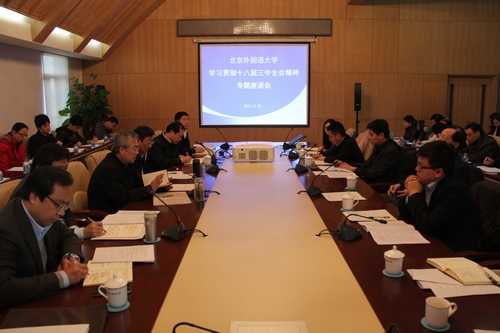
In his speech, President Han Zhen explained the significance and main connotation of the spirit of the Third Plenary Session of the Eighteenth Central Committee from three aspects. First, the "Decision" passed by the Third Plenary Session marks that China will start a comprehensive and comprehensive reform of overall and systematic systems, which has an important historical status. The goal of construction, a comprehensive reform of a social governance method. Third, the "Decision" on comprehensive deepening reform measures and strengthening the construction of the system is a structural and deep reform of a social governance method. President Han Zhen emphasized that Beiwai should take the opportunity of implementing the spirit of the Third Plenary Session as an opportunity to continuously deepen reforms, optimize the structure, improve the efficiency of school running, and improve the competitiveness of Northword teachers. The first is to optimize human resources structure, especially the academic structure, ability structure and quality structure of the teacher team, so that it meets the requirements of cultivating high -quality composite talents; the second is to optimize the structure of academic organizations, which is conducive to the cultivation of composite talents. It is conducive to the cross -integration of knowledge; the third is to optimize the structure of the management department and avoid the cross between departments and pushing each other. President Han Zhen focused on the "innovative college talent training mechanism and promoting the first -class competition of colleges and universities" proposed by the Third Plenary Session, and pointed out that: First, based on traditional advantages, the characteristics and advantages of cultivating talents must be promoted. The second is to further strengthen academic drivers, adhere to the development of students, and continuously strengthen the consciousness of teaching and scientific research services, and strengthen the consciousness of student growth services. The third is to establish an excellent spirit of "no best, only better", break through personal love and narrow interest obstacles, and balance the relationship between scale, benefits and quality.
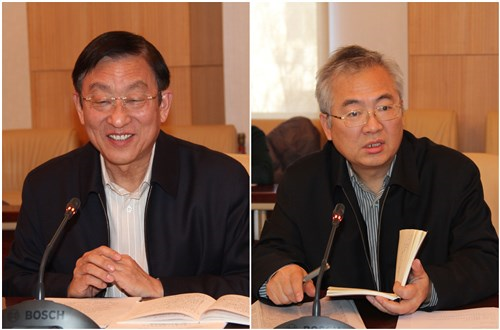
Professor Zhang Zhongzai of the School of English has experienced the development and changes of modern universities after the liberation of China, and witnessed the entire process of reform and development of higher education in China. He stood at the forefront of reform and looked at the development and change of colleges and universities, and looked at the overall situation of educational reform at the characteristics of Beiwai, and focused on the spirit of the Third Plenary Session. Professor Zhang Zhongzhang pointed out that deepening the reform of education needs to improve the quality of education and teaching as the basic work. By adjusting the disciplinary layout and professional settings, the construction of a high -quality teacher team structure has been promoted to promote education from focusing on scale to quality. To deepen the reform of educational reform, the phenomenon of rectifying the light humanities and social sciences of science and technology. While proposing "functionalism", the bourgeoisie also proposed its negative impact of chasing utilitarian utilitarian. Higher education should strengthen humanities, and students in foreign language colleges must strengthen humanistic cultivation, avoid the instrumental value of foreign language language, and learn professional and general knowledge and skills in a good human environment. To deepen the reform of education, we need to further increase investment in education, continue to care and improve the working conditions and living benefits of teachers, and create a policy environment for respecting knowledge and respect for talents. For North foreign countries, through optimizing the discipline structure, optimizing the structure of cadres and teachers, driving the reform of education and teaching, improving the quality of talent training, assuing national responsibilities, and actively playing the special role of foreign language universities.
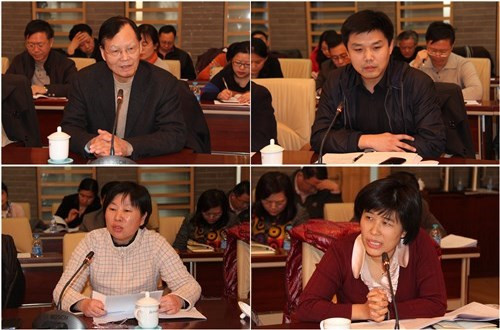
Professor Zhao Gang, dean of the School of European Language and Culture, spoke around the theme of "How Foreign Language Discipline Service Services Sina for China's Reform and Opening and Opening up". He believes that, with the formation of China's international status and strategic pattern, while maintaining traditional advantages such as teaching and research in the north to maintain language and literature, it is necessary to continuously deepen the reform of the talent training model from the national strategic needs. Make new positioning in the field, strengthen the research of regions, countries, and follow -up research of international issues and hot issues, and actively undertake the task of national think tanks. There are both conditions and demands in Beiwai.
Professor Zhang Nini, dean of the School of Philosophy and Social Science, has always paid attention to the construction of ecological civilization. She believes that the construction of ecological civilization, as a basic project construction, requires all citizens to have a high concept of ecological civilization. Vigorously strengthening the education of ecological civilization in college students is the focus of attention to the construction of ecological civilization, and it is also the strong driving force and fundamental guarantee for the construction of the ecological environment. Universities need to enable ecological civilization education to enter the classroom and integrate into the ideological and political education work of universities to help students establish the concept of ecological civilization, and then drive the awareness of energy protection for the whole society.
Wang Fang, secretary of the Party Branch of the Foreign Research Society, spoke on the strategic development of foreign research institutes in the background of the cultural industry's development. She believes that a series of reform measures such as "encouraging non -public -owned cultural enterprises and allowing participation in publicity and online publication" have provided opportunities for the next development of foreign research institutes and brought severe challenges. Foreign research institutes will carry out in -depth cooperation with non -public ownership enterprises in digital publication and other fields, using the strong content resources and management capabilities of foreign research institutes, as well as the market -oriented operation and technological operation advantages of non -public ownership enterprises to jointly develop first -class digital education products that are more adaptable to personalized learning. To achieve the strategic goal of "digital, internationalization, and capitalization" proposed by the 12th Five -Year Plan.
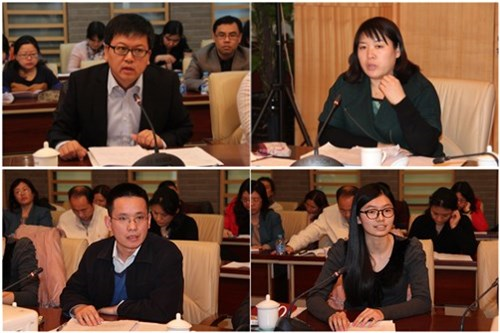
Associate Professor Niu Huoyong, Dean of the International Business School, made a speech based on the educational and historical mission of educational history and the development direction of the Beiwai International Business School. He believes that under the important guidance of marketization reform in the Third Plenary Session of the 18th Central Committee, the Education of North Foreign Sciences should actively reform the modern educational model and advocate the characteristics of the north and foreign characteristics in the concept of running the school. Continuously deepen the combination of foreign languages and business majors, and take the international and high -end routes, so that Beiwai students have high levels of foreign language level and international vision. We strive to achieve the extreme in spreading knowledge, strive to introduce more talents in order to create knowledge, and try their best to build a larger platform in serving society. In terms of talent training, it is necessary to spread the spirit of entrepreneurs, encourage students to innovate, but also strengthen the education of values, so that students have the courage to bear social responsibility, and become high -end talents with existing principles and elasticity.
Associate Professor Yao Jinju of the Law School spoke around the "education concept of the rule of law and the education of legal systems". She said that it has become a consensus to lead the rule of law in the field of education, promote the education of the rule of law, and lead the rule of law, standardize the behavior of running schools, and protect legitimate rights and interests. The rule of law of colleges and universities means the improvement of the autonomy of running schools and the internal governance structure of universities. It is necessary to strengthen the autonomy of running schools, strengthen social cooperation, and regulate the relationship between universities, governments, and society with the rule of law. To clarify the internal relationships of schools and colleges, academic and administrative, school, schools, teachers and students, etc., it is possible to adopt measures such as articles of association, information disclosure, inter -school appeal, and establishment of specialized legal institutions.
Associate Professor Shi Zehua at the School of International Relations spoke around the question of "why reform needs top -level design". He believes that first, the "top -level design" is consistent with the arrangement of public power structure in socialist countries, which is more consistent with the top power operation methods in my country, and it is easier to make coordination, balanced structure, and resource sharing. Second, the "top -level design" is in line with the general experience and tradition of previous reforms since China's reform and opening up, and the people's expectations of the people's expectations for reform. Third, the "top -level design" is conducive to the formation and compliance of the rules, and can effectively change the problem of personalization and "hidden rules" more than the rules.
The French -speaking department Han Jing said that the growth of contemporary college students in the era of reform and opening up will become the main force, performers and ultimate beneficiaries of the new round of reform. This urgently requires them to complete the transformation at the university. While pursuing excessive professional qualities, they focus on the comprehensive shaping of personality and humanistic cultivation, and become high -quality talents that meet market demand at graduation. For Beiwai students, in the new international environment, we must stand at the tide of reform, improve the professional standards, and strive to achieve compound talents that we have in others. A new round of reform.
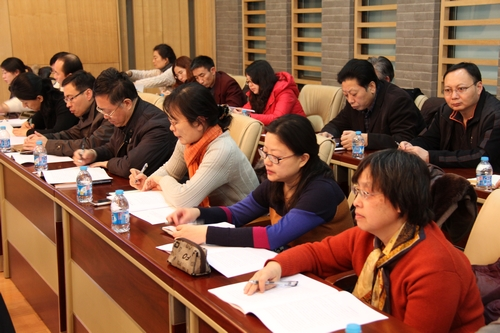
In a concluding speech, the party committee secretary Yang Xueyi pointed out that the "Decision" passed by the Third Plenary Session of the Eighteenth Central Committee of the Communist Party of China and the Plenary Session showed the Party Central Committee's high attention and determination to the deepening reform. Some of the new views and new expressions mentioned by the Third Plenary Session, such as advancing the modernization of national governance and governance capabilities, and a decisive role in the allocation of the market in the allocation of resources, reflecting the party's further deepening of promoting the concept of reform. Based on the actual situation of the school, Secretary Yang Xueyi pointed out that the spirit of implementing the Third Plenary Session of the Eighteenth Central Committee must focus on the following four aspects: First, change the concept, strengthen the spirit of reform, and strive to achieve three breaks. That is, the consciousness of "breaking" the self -proclaimed and the closure of the frog at the bottom of the well, "standing" to look at the world, and the open concept of openness; Ming Zhe protects his body and complains of the heavens, and "Li" dares to think about it and bravely go forward. The second is to improve the training model of characteristic talents according to the national economic and social needs. Based on the traditional advantages of the school, aiming at the needs of the country's economic and social needs, and continuously improve the talent training model of "composite, compound, and internationalized". The third is to innovate the work of party building and give full play to the core of leadership and the role of fighting forts. In particular, we must strengthen the construction of young teachers and improve the acuity and alertness of doing ideological work. It is necessary to combine the education and practice activities of the mass line, break the topic from the most difficult place for development, start from the dissatisfaction of teachers and students, and continue to build a good style through the establishment of the rules. The fourth is to adhere to educating people and cultivate qualified talents. The reform and innovation of colleges and universities should focus on meeting the comprehensive needs of young students' growth, and implement "educating people" to all aspects and specific aspects of education, teaching, management services.
The symposium was chaired by Zhao Yan, deputy secretary of the party committee. Jiang Xufan, deputy secretary of the party committee, Peng Long and Jia Dazhong, vice presidents, Yang Jianguo, assistant principal, secretary of the party branch, and representatives of the relevant functional departments and teachers and students attended the symposium. Wang Dadong, director of the Ministry of Education of Guangming Daily, and staff of other news units also attended the symposium.
(Reporter Zhang Wenchao)

